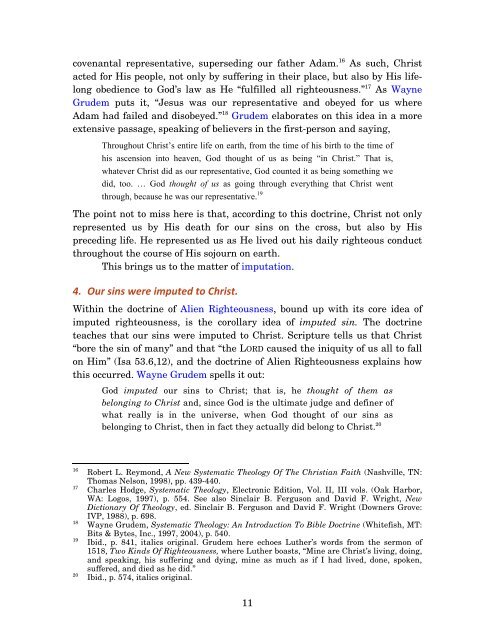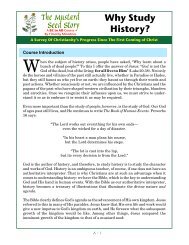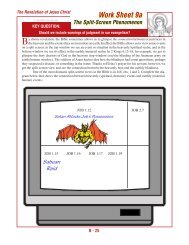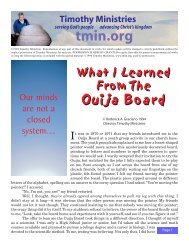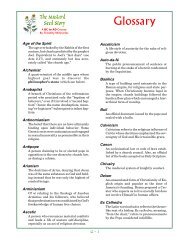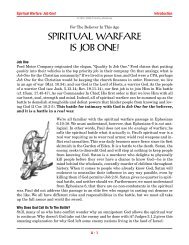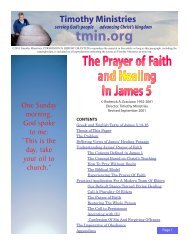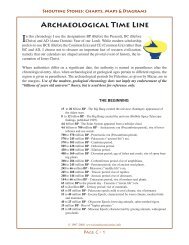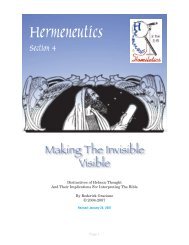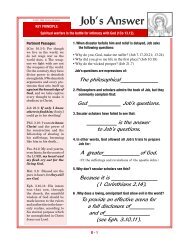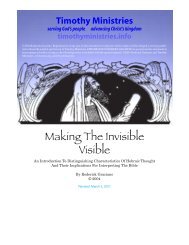Alien Righteousness? - Timothy Ministries
Alien Righteousness? - Timothy Ministries
Alien Righteousness? - Timothy Ministries
Create successful ePaper yourself
Turn your PDF publications into a flip-book with our unique Google optimized e-Paper software.
covenantal representative, superseding our father Adam. 16 As such, Christ<br />
acted for His people, not only by suffering in their place, but also by His lifelong<br />
obedience to God’s law as He “fulfilled all righteousness.” 17 As Wayne<br />
Grudem puts it, “Jesus was our representative and obeyed for us where<br />
Adam had failed and disobeyed.” 18 Grudem elaborates on this idea in a more<br />
extensive passage, speaking of believers in the first-person and saying,<br />
Throughout Christ’s entire life on earth, from the time of his birth to the time of<br />
his ascension into heaven, God thought of us as being “in Christ.” That is,<br />
whatever Christ did as our representative, God counted it as being something we<br />
did, too. … God thought of us as going through everything that Christ went<br />
through, because he was our representative. 19<br />
The point not to miss here is that, according to this doctrine, Christ not only<br />
represented us by His death for our sins on the cross, but also by His<br />
preceding life. He represented us as He lived out his daily righteous conduct<br />
throughout the course of His sojourn on earth.<br />
This brings us to the matter of imputation.<br />
4. Our sins were imputed to Christ. <br />
Within the doctrine of <strong>Alien</strong> <strong>Righteousness</strong>, bound up with its core idea of<br />
imputed righteousness, is the corollary idea of imputed sin. The doctrine<br />
teaches that our sins were imputed to Christ. Scripture tells us that Christ<br />
“bore the sin of many” and that “the LORD caused the iniquity of us all to fall<br />
on Him” (Isa 53.6,12), and the doctrine of <strong>Alien</strong> <strong>Righteousness</strong> explains how<br />
this occurred. Wayne Grudem spells it out:<br />
God imputed our sins to Christ; that is, he thought of them as<br />
belonging to Christ and, since God is the ultimate judge and definer of<br />
what really is in the universe, when God thought of our sins as<br />
belonging to Christ, then in fact they actually did belong to Christ. 20<br />
16<br />
17<br />
18<br />
19<br />
20<br />
Robert L. Reymond, A New Systematic Theology Of The Christian Faith (Nashville, TN:<br />
Thomas Nelson, 1998), pp. 439-440.<br />
Charles Hodge, Systematic Theology, Electronic Edition, Vol. II, III vols. (Oak Harbor,<br />
WA: Logos, 1997), p. 554. See also Sinclair B. Ferguson and David F. Wright, New<br />
Dictionary Of Theology, ed. Sinclair B. Ferguson and David F. Wright (Downers Grove:<br />
IVP, 1988), p. 698.<br />
Wayne Grudem, Systematic Theology: An Introduction To Bible Doctrine (Whitefish, MT:<br />
Bits & Bytes, Inc., 1997, 2004), p. 540.<br />
Ibid., p. 841, italics original. Grudem here echoes Luther’s words from the sermon of<br />
1518, Two Kinds Of <strong>Righteousness</strong>, where Luther boasts, “Mine are Christ’s living, doing,<br />
and speaking, his suffering and dying, mine as much as if I had lived, done, spoken,<br />
suffered, and died as he did.”<br />
Ibid., p. 574, italics original.<br />
11


